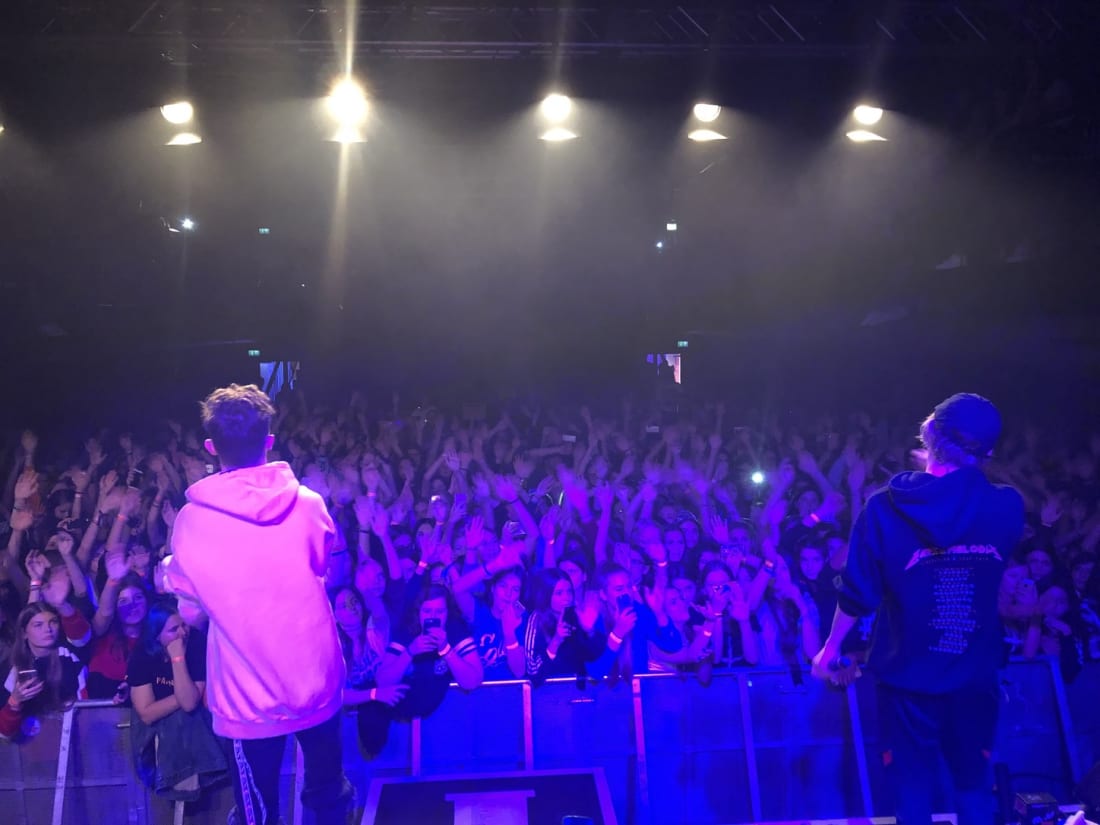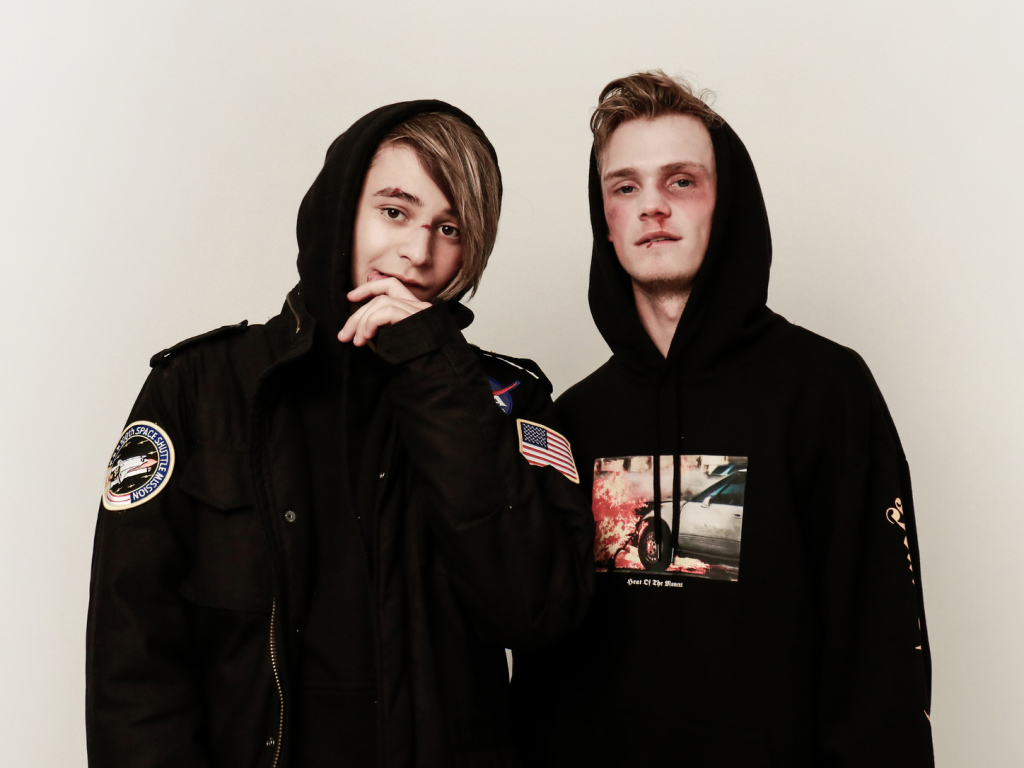It all started in 2013 when 13-year-old Welsh rapper Leondre Devries contacted 15-year-old English singer Charlie Lenehan on Facebook after watching one of his videos. Forming the pop duo Bars and Melody, less than a year later the charming, but raw, teens appeared on Britain’s Got Talent, wowing the crowd with their rendition of “Hope” by Twista and Faith Evans. With Lenehan crooning the chorus, Devries delivered his own rap lyrics, sharing an anti-bullying message inspired by his own experiences.
With Simon Cowell’s golden buzzer, the duo were launched into pop stardom. After finishing third on Britain’s Got Talent and signing with Syco Music, they performed on The Ellen Degeneres Show and developed their own group of devoted followers called “Bambinos.”
“It’s too much to comprehend how quickly it changed”, says Lenehan. Two years later, they released their first Japanese album titled “Hopeful,” produced by Avex. After releasing a second Japanese album in 2017, Bars & Melody will return to Tokyo this December. Before their tour, Charlie, now 20, and Leondre, 18, talked with TW about their admiration for Japan and the whirlwind of the last four years.
Leondre, you have advocated against bullying throughout your career. What was your experience with bullying and how were you able to overcome the psychological scars?
Leondre: When I was transitioning from elementary school to middle school, I had a hard time because I liked different things. I didn’t listen to ‘cool music.’ I liked a lot of rock and rap music and people didn’t really like that; it was too different. I like skateboarding and I was rejected because of that, too. I used to write down how I was feeling, my thoughts, as an outlet for all these built up emotions. It was hard to get through, but once I gathered enough courage, I told my mum, who helped a lot. But without music, I don’t think I could have done it.
Speaking of music… Charlie, what inspired you to start singing at such an early age?
Charlie: I discovered early that I had an ear for music when I picked up a djembe at age 7. I automatically had rhythm, so my teachers pushed me to learn guitar. I then finally found out I could sing and I built my voice naturally.
What response did you receive from friends and family when you first expressed your desire to go into music and appear on Britain’s Got Talent?
Charlie: My mum actually laughed at me the first time I told her I could sing but when she watched me on a school talent show, she cried and gained 100 percent belief in me. After that, she basically gave up her life so I could continue my music career.

Did you have a prior interest in Japan before making your album with Avex?
Leondre: I have always been interested in Japanese animation and reading manga. That was a part of my childhood. Not a lot of people where I’m from share this interest, hence why I was bullied. So for me to be able to go to Japan and indulge in the culture is a dream come true.
Charlie: Like the song “Big In Japan,” by Alphaville, it’s a big deal and a big market, so of course I was interested. It was a milestone in our career to finally announce our tour dates.
How has your reception been in Japan?
Leondre: The reaction has been overwhelming. Our show in Osaka has completely sold out. We announced an extra date in Nagoya and the same in Tokyo. We can’t wait to put on an amazing show. We owe it to our Japanese fans for waiting so long for us to come back.
You’ve been to Tokyo a few times. What is your impression?
Leondre: I love Tokyo. It really is a creative place. Seeing so many people live in such density but in such harmony is really inspiring. Everyone seems friendly and as if they cannot do enough for you.
Charlie: It was so crazy, I can’t even remember both trips. It’s such a fast-moving place with so much to see. I’m just as excited to go again as I was the first time, if not more.
What do you do for fun here?
Leondre: In Tokyo, I love going to the arcade and checking out the anime or manga stores. I love video gaming, especially video games inspired by or produced in Japan. They have such a beauty about them that is unrivalled compared to anywhere else in the world.
Your favorite Tokyo experience?
Charlie: Definitely the grape-flavored sweets… They are amazing.
Leondre: The best experience in Tokyo for me was performing at the A-Nation Festival alongside BIGBANG. It was crazy to perform in front of so many people.
Have you noticed a difference between Japanese fans and English fans?
Charlie: Everyone is extremely respectful… The English fans are respectful as well but the Japanese fans go above and beyond to be as polite and as nice as they can be. I love Japanese culture, it’s so beautiful.

How difficult is it to sing in Japanese? Will you be singing more songs in Japanese during your upcoming performances?
Charlie: We may perform the Japanese version of “Hopeful” on the next tour. For me, singing in Japanese was easy with the help of Japanese-speaking people. They helped us by writing it out phonetically. It was a whole day of recording though, so it was tough.
What do you consider to be the biggest challenge in your career?
Charlie: Definitely finding healthy sleeping patterns. That’s my biggest problem. It’s so hard to create a sleeping pattern when you have no fixed schedule and when you are constantly on the move with a new schedule everyday.
Now that you have received international acclaim, have you experienced a different level of bullying? How do you handle the negative attention that fame attracts?
Leondre: With anything successful, I feel as if there is no way to avoid hate. We measure our success in happiness and how many people we affect with our music. We strive to make our music carry a message in a way no one else can. We try to be ourselves. We are different but it’s just the way we are; we don’t try to be a character we’re not. And it’s nice to have [Charlie] who can relate and go through it with you.
How has your message in your songs evolved as your music matures?
Leondre: The world has changed a lot since I was thirteen. Everything in today’s world seems to be falling apart. It feels as if we’re so out of love, so out of unity. These issues worry us, and our music is just a way to bring a group of people together, no matter who they are, whether they are black or white. We strive to bring a sense of community and if one of our supporters goes through something, we’re going through it with them.
Charlie: It has 100 percent changed. We have a completely different style now. I don’t want to go into it too much as it might spoil the next album.
Lastly, what message do you have for your Japanese audience?
Leondre: Thank you for your continued support and love even though it has taken us so long to come back. We really appreciate you guys and we can’t wait to see you at our concerts!
Charlie: We’re very sorry it took us so long to come and tour for you guys but we are finally coming and are very excited to see you!

Check the Tokyo Weekender events calendar for information about Bars and Melody’s Tokyo performance on January 14th.
Updated On April 26, 2021








